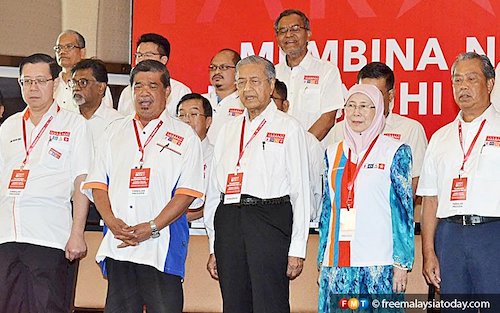Malay support for Pakatan Harapan eroding badly

122 out of the 222 parliamentary seats up for grabs in the country are Malay-majority. If the Malay voters are unhappy with the ruling coalition, coupled with increasing alienation among non-Malay voters, PH will very likely lose the next election.
Lim Sue Goan, Sin Chew Daily
The latest Merdeka Center poll shows that Pakatan Harapan’s support among the Malays at this moment is very low, having to face powerful threats from BN and PAS in 122 Malay-dominant parliamentary constituencies on the peninsula.
As a matter of fact, by-election results in Tanjung Piai and elsewhere have shown that PH’s, in particular PPBM’s support among the Malays has trailed far behind Umno and PAS.
122 out of the 222 parliamentary seats up for grabs in the country are Malay-majority. If the Malay voters are unhappy with the ruling coalition, coupled with increasing alienation among non-Malay voters, PH will very likely lose the next election.
A big challenge PH has to face before the Lunar New Year will be the parliamentary by-election in Kimanis, Sabah.
63.8% of the voters in Kimanis are Muslims, 28.5% non-Muslim bumiputras and 7.7% Chinese and other ethnic communities. Parti Warisan Sabah was able to unseat BN in GE14 mainly because of the strong support from the bumiputras in the state. If Warisan loses this by-election, it shows that the widespread public frustration has now spread to the East Malaysian state.
As for the sharp decline in PH’s support among the Malays, PPBM actually has several options, including completely giving up non-Malay votes and wrestling with Umno-PAS down the conservative and racist path.
A second option is to not give up non-Malay votes. While keeping the racial quotas, the government is also introducing policies that should please the non-Malay communities.
Thirdly, PPBM will continue to divide Umno and rope in Umno elected reps to firm up its own grassroots base. Of course, a more extreme option is to team up with the rival camp to extend its ruling partner status.
Mahathir must be cracking his head now to seek the most optimal solution to break through the current dilemma. The prime minister has already proven to the world that politics is an art that turns the impossible into possible.
For example, during the 1999 general elections, when BN was facing tremendous pressure from the Reformasi movement, Mahathir applied the fear tactic to keep the Chinese away from street protests as well as PAS’ Islamic State and hudud propositions. While in the end he lost the Malay support, he managed to get the Chinese to back him so that he could stay in power.
A year after the elections, Mahathir dismissed the 1999 Chinese organisations appeal as communism and Al-Maunah extremism. The local Chinese community felt utterly battered by his move. Nevertheless, Chinese Malaysians opted to trust him again in 2018, and the results in these two general elections show that indeed voters’ attitude could be easily manipulated.
Will the same old trick be adopted again come the 15th general elections?
PPBM’s racial policy has done nothing much to improve the party’s standing among the Malay voters but has been unwittingly hijacked by the Umno-PAS alliance. Even Maszlee Malik’s resignation has been distorted by the opposition as the government’s submission to DAP.
Such exploitation of racial sentiment is transporting us back to the bygone Mahathir 1.0 era.
Perlis mufti Asri Zainul Abidin, for instance, has called Dong Zong extremist subversives posing severe threats on par with the terrorists. Once again a Malaysian Chinese organisation is slapped with a terrorist label!
For decades, politics has not brought much progress and development to the country. Our politicians continue to play up sensitive issues to win over the voters. Our Vision 2020 has failed largely because of politics. It is politics that has bogged down the country’s progress.
The 2020 New Year message by Singapore’s deputy prime minister Heng Swee Keat should offer us a good insight. On the “Singapore Together” campaign, Heng said, “We must not allow our differences to divide us. Instead, we must harness our diversity as a strength.”
Singapore has already become a high-income developed country without the need of any glamorous vision because their leaders do not engage in racial politics. The city-state appreciates its diversity and has harnessed it as a strength to bring greater prosperity to its people.
Unfortunately here in Malaysia, we choose to divide among ourselves, and let the conflicts arsing from our differences to kill our mutual trust, spawn hatred, disrupt national unity and bog down our progress.
This explains why there is such a vast disparity in the two countries’ development.
Denying all citizens equal rights will only serve to bolster a particular community’s arrogant attitude. PAS president Hadi Awang claims that Suhakam’s move in criticising the police for a court injunction to block Dong Zong’s congress has hurt the feelings of the country’s Muslims, because that organisation is not defending Islam! This shows that PAS has put religion far above human rights and individuals’ freedom.
If we had abandoned racial politics, this country would not have been plunged into the quagmire of unnecessary squabble over Jawi, closure of Chinese and Tamil primary schools and the Malay Dignity Congress.
The Merdeka Center poll shows that 61% of correspondents feel that the country is heading in the wrong direction. While 62.8% of Malays, 59.5% of Chinese and 59.4% of Indians are worried about the country’s economy, our leaders appear to be interested only in politicking.

